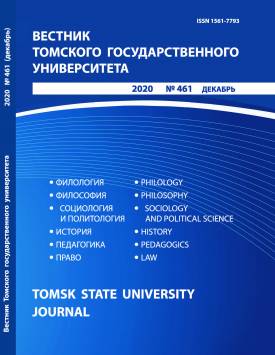Speech Etiquette Formulas With Good Wishing Semantics in the Discourse of Speakers of Middle Ob Dialects as a Reflection of Folk Mentality
For the first time, the article examines etiquette formulas of good wishing as an important component of Russian speech etiquette on Siberian material. The semantics of etiquette formulas, their composition and functioning in the discursive practice of speakers of Middle Ob dialects are considered. The analysis of good wishing in the dialect discourse gives grounds for referring wishes of health, divine salvation from sins and acquisition of the heavenly kingdom by the soul to the nuclear zone. The intermediate zone between the nucleus and the periphery with fuzzy boundaries includes wishes of the protection of God, good results of work, acceleration and facilitation of the work process, and happiness. The peripheral zone is made up of wishes of pleasure, replenishment of strength during rest, longevity, meeting, abstract good in general. The composition of etiquette formulas includes all-Russian and a relatively small share of non-literary elements, which is typical of the Middle Ob dialects of secondary formation, in contrast to the native ones. Obsolescent and outdated units are widely represented. The objects of good wishing reflect the values of the Russian national and religious consciousness with their peculiar refraction in the traditional folk culture. Health, representations of the Christian religion and work are particularly significant in this regard. Health is a universal human value; however, in the peasant culture, which has developed as agricultural and is associated with large physical labor costs, it is given special importance: without maintaining a normal state of the body, a person cannot successfully exist in rural society. The understanding of health as the highest life value is verbalized not only in etiquette formulas, but also in the spontaneous speech of peasants. The processes of desacralization of Russian society in the Soviet period led to the ousting of traditional peasant religiosity as a special type of spiritual life from the sphere of reflection, but it is preserved in everyday life, customs and language, including in the formulas of speech etiquette with nominations of religious themes. The formation of a ramified system of wishes to the worker and their active functioning in dialects was determined in the past by the relevance of many different specialized types of labor, as well as by the weak difference between the household and production spheres in the traditional rural community. Changes in the life of villagers today have led to the archaization of such formulas. The Middle Ob material demonstrates a significant number of good wishing and their high frequency in the speech of villagers. The regional discourse is abundant with etiquette formulas used in various situations (greetings, goodbyes, gratitude, praise, treats, congratulations, etc.); this reflects benevolence as a communicative constant of Russian culture, the adherence to which among dialect speakers is supported by the centuries-old tradition.
Keywords
Russian speech etiquette, etiquette good wishes, folk speech culture, folk mentality, Middle Ob dialectsAuthors
| Name | Organization | |
| Ivantsova Ekaterina V. | Tomsk State University | ekivancova@yandex.ru |
References

Speech Etiquette Formulas With Good Wishing Semantics in the Discourse of Speakers of Middle Ob Dialects as a Reflection of Folk Mentality | Vestnik Tomskogo gosudarstvennogo universiteta – Tomsk State University Journal. 2020. № 461. DOI: 10.17223/15617793/461/5
